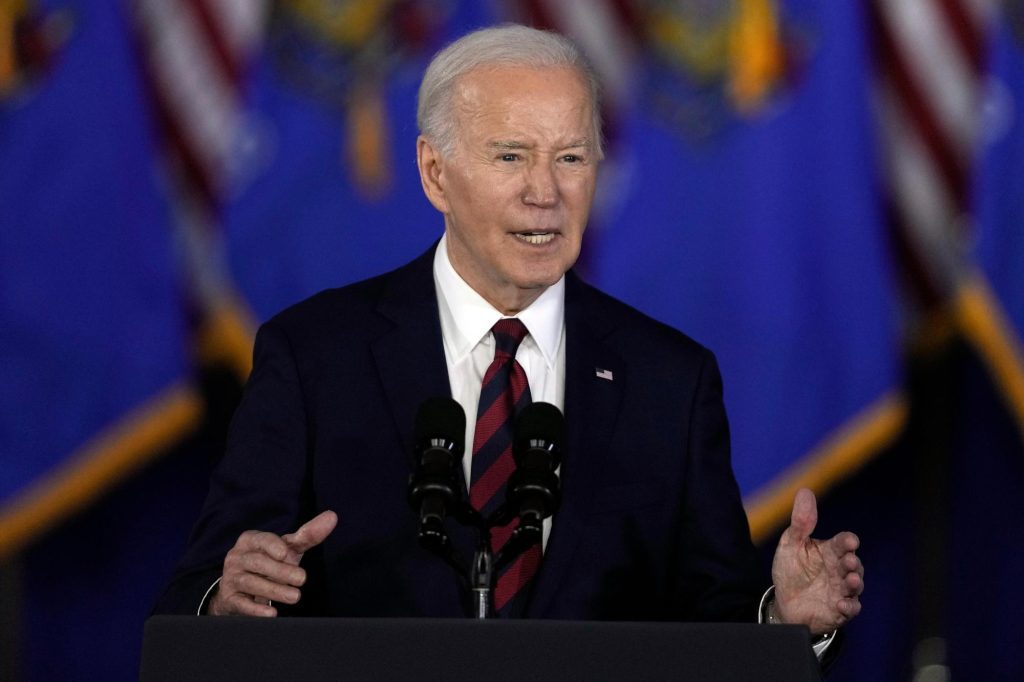By JOSH BOAK (Associated Press)
WASHINGTON (AP) — President Joe Biden has announced his opposition to the sale of U.S. Steel to Nippon Steel of Japan, stating that it's crucial for the U.S. to have strong American steel companies run by American steel workers.
In a statement, Biden added: “U.S. Steel has been an iconic American steel company for more than a century, and it is vital for it to remain an American steel company that is domestically owned and operated.”
By opposing the merger, Biden has chosen to support unionized workers in a critical election year at the risk of upsetting the business community and an essential ally in Japan. Thursday’s announcement, coming as Biden is campaigning in the Midwest, could have ripples in his race against the presumptive Republican presidential nominee, Donald Trump.
The Democratic president has made the restoration of American manufacturing a cornerstone of his agenda as he seeks reelection, and he has the endorsements of the AFL-CIO and several other prominent unions.
Nippon Steel announced in December that it planned to buy the Pittsburgh-based steel producer for $14.1 billion in cash, raising concerns about what the transaction could mean for unionized workers, supply chains and U.S. national security.
The Japanese company has tried to calm fears by promising no job losses due to the merger. It also committed to keeping the U.S. Steel name and Pittsburgh headquarters, while noting it already has a presence in the American market and would bring in new resources to foster job growth.
The company, which is the world’s fourth largest steel producer, launched a website with supportive statements from Larry Summers, the former treasury secretary, and Pat Toomey, a Republican and former senator from Pennsylvania.
Shortly after the steel deal was announced, the White House indicated it would be under review by the secretive Committee on Foreign Investment in the United States. The government does not officially provide updates on the CFIUS review process.
Biden has a big platform to share his opinion on the matter, but he is not getting involved in the review process or officially stopping the deal, according to a person familiar with the discussions who asked not to be named.
When asked about the deal on Thursday, White House national security spokesman John Kirby refused to say whether the president wanted to stop it completely or would be open to changes in its structure. But Kirby told reporters that the United States sees its alliance with Japan as “stronger than it’s ever been.”
Still, the president has influence over CFIUS. The treasury secretary leads the committee, which also includes the heads of federal agencies and, when necessary, directors of White House councils on the economy and national security.
Trump said earlier this year after meeting with the Teamsters union that he would stop the U.S. Steel acquisition: “I would block it. I think it’s a horrible thing, when Japan buys U.S. Steel. I would block it instantaneously.”
Biden plans to go to Saginaw, Michigan on Thursday. Saginaw used to have many General Motors plants and Biden is hoping that his support from union workers will appeal to voters there.
The city is in a swing county that narrowly supported Trump in 2016 but then switched to Biden in 2020, making it an important race in this year's presidential election.
Biden has a strong connection with the United Steelworkers. He personally assured the union members in February that he supports them. U.S. Steel is based in Pennsylvania, which is also a crucial state in this year's election.
Last week, the United Steelworkers expressed concerns about Nippon Steel honoring existing labor agreements and being transparent about their finances after meeting with their representatives. They also mentioned difficulties in finalizing a merger.
The U.S. views Japan as a close ally and an important partner in countering China's influence in Asia. Biden has visited Japan twice as president and is set to host Japanese Prime Minister Fumio Kishida at the White House on April 10.
Nippon Steel's ties to China have raised worries within the Biden administration. China produces over half of the world's steel, according to the World Steel Association. India ranks second in production, followed by Japan and the United States.
In a February blog post, the U.S. Chamber of Commerce cautioned the Biden administration against blocking the deal. They warned that doing so could harm foreign investment in the U.S., prompt other countries to block U.S. companies' overseas investments, and weaken the U.S.-Japan alliance.
John Murphy, who handles international matters for the chamber, criticized Biden's politicization of the CFIUS review, describing it as inappropriate and counterproductive.
Murphy emphasized the importance of the CFIUS review and stated that if no national security concerns are found, the sale should proceed as expected.
However, Sen. Bob Casey, D-Pennsylvania, who is running for reelection, praised Biden's position, vowing to strongly oppose any deal that leaves U.S. Steelworkers behind.
___









